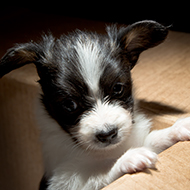
Dogs Trust calls for urgent government action to prevent further suffering.
New research by Dogs Trust has revealed that almost a third of puppy buyers would be willing to 'turn a blind eye' to the illegal puppy trade to get the dog they want.
In a poll of 2,000 people across the UK, 30 per cent of respondents said they would be willing to buy a puppy, even if they suspected it had been illegally smuggled into the country.
Furthermore, 44 per cent of people said they would be willing to buy a puppy from an online advert. This figure is despite 41 per cent saying they knew someone who had been scammed, and 60 per cent saying they were concerned that it is easier to be scammed since the pandemic.
Dogs Trust has been highlighting the issue of illegal puppy trade for more than six years, but says the government has yet to take any significant action. The organisation is now calling on ministers to urgently raise the minimum age for puppies to enter the UK to six months, to make them less desirable, and to increase penalties for those found guilty of smuggling.
Dogs Trust veterinary director Paula Boyden said: "The findings of our latest research demonstrate that it’s more important than ever that the Government takes action to stop the suffering of puppies at the hands of cruel traders. Pups continue to pay for every day of Government delay.”
She added: “We want people to understand that buying an illegally imported puppy has huge implications for both the pups - who have to travel miles across borders in awful conditions - and the mums who are basically breeding machines. Too many would-be dog owners simply do not pay attention where their puppy comes from, and this must stop.”
Just weeks before the coronavirus lockdown in March, the government launched its 'Petfished' campaign to educate the public on the illegal pet trade and help them spot ‘red flags’ when buying puppies. But with more people at home, the pandemic has seen demand for some of the UK's most popular dog breeds soar.
Dogs Trust believes this rise in interest created the 'perfect storm' for criminals looking to cash in. Between March and the end of November, the organisation rescued 257 puppies illegally imported into the country from overseas as well as 16 heavily pregnant mums. These alone were worth over £570,000, the charity said.



 The latest
The latest